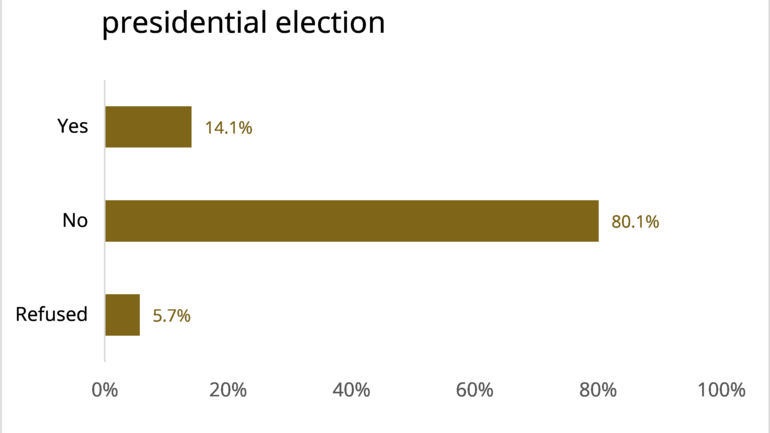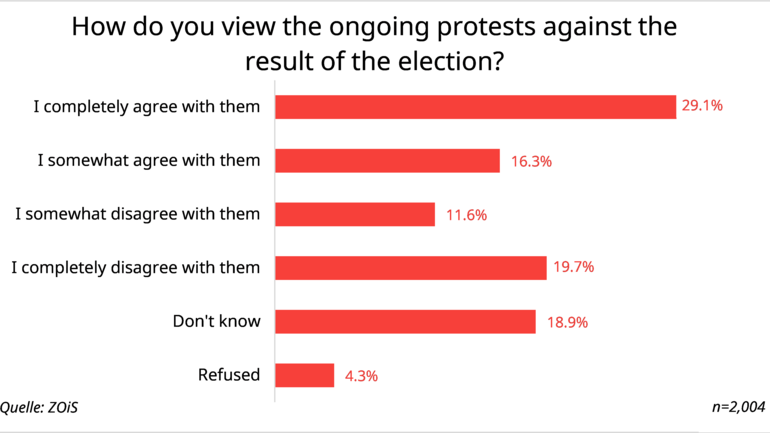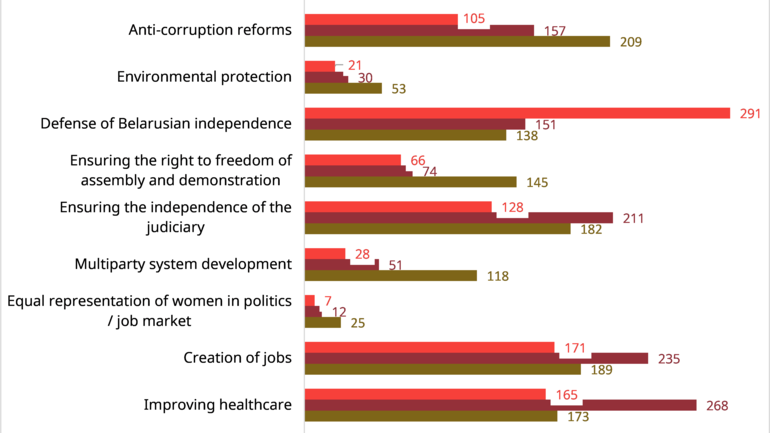New Belarus survey: politicised society with strong expectations regarding political change
We still know too little about the public mood in Belarus. As the protests continue to be suppressed, it becomes even more important to understand societal attitudes and preferences. A new ZOiS Report presents the results of one of the first large surveys of the population since the start of the mass protests in Belarus last August.
The survey, conducted in December 2020 among Belarusians aged between 16 and 64, reveals rare insights into the political and social mood across the country, trust in its institutions, the dynamics of the recent political mobilisation, and the domestic and foreign policy preferences of Belarusian citizens.
Across Belarus, 65 per cent of those surveyed partly or completely agreed that the 2020 presidential election result had been falsified in favour of the incumbent. The actual outcome of the contested election may never be known. In our survey, about 53 per cent of those who voted said they had opted for Sviatlana Tsikhanouskaya, and about 18 per cent for Aliaksandr Lukashenka.
Protest participation, views on protest and political interest
About 14 per cent of respondents participated in the protests after the election (Figure 1). ‘This level of participation is remarkable compared with previous cases of mobilisation’, the authors note. Politicisation reaches beyond protest participation: nearly half the respondents personally know someone who had taken part in the protests; and close to 60 per cent state that they have become more interested in politics. Views on the protests in the general population are diverse, ranging from agreement to disagreement; a sizeable share of respondents did not express an opinion on the demonstrations (Figure 2).
The most frequently given reason for taking part in the protests is the large-scale violence against protesters. ‘This underlines the fact that repression in an age of social media is a risky strategy for an autocratic regime, as the circulation of images of violence may encourage even more people to take to the streets, including the parents and grandparents of the initial injured and arrested protesters’, the ZOiS Report states.
The data convey that people have strong expectations of concrete political changes, such as ‘new elections’. Things that the respondents expect from any new political leadership include political participation (‘giving citizens a real voice in the political process’) and economic priorities, most importantly the improvement of living standards and the creation of jobs (Figure 3).
Democracy and geopolitical orientation
In their understanding of democracy as well as their geopolitical orientations, protesters and non-protesters—or those who trust Tsikhanouskaya and those who back Lukashenka—differ. Closer relations with the EU and bilateral relations with Russia limited to economic cooperation are preferred by protesters, those who trust Tsikhanouskaya, and those who report higher levels of political interest as a result of developments since August 2020.
The survey maps a considerable degree of societal politicisation beyond participation in the protests, which is also apparent in the patterns of news consumption. More than 70 per cent of respondents reported that they got most of their information from social media and online media platforms. Only about 10 per cent said they turned to state media outlets as their main source of information. ‘It is here that the medium-term pressure on the Lukashenka regime lies’, the authors conclude, ‘even if the protests do not regain strength in the coming months.’



Publication
Nadja Douglas, Regina Elsner, Félix Krawatzek, Julia Langbein, Gwendolyn Sasse: ‘Belarus at a crossroads: attitudes on social and political change’, ZOiS Report 3 / 2021